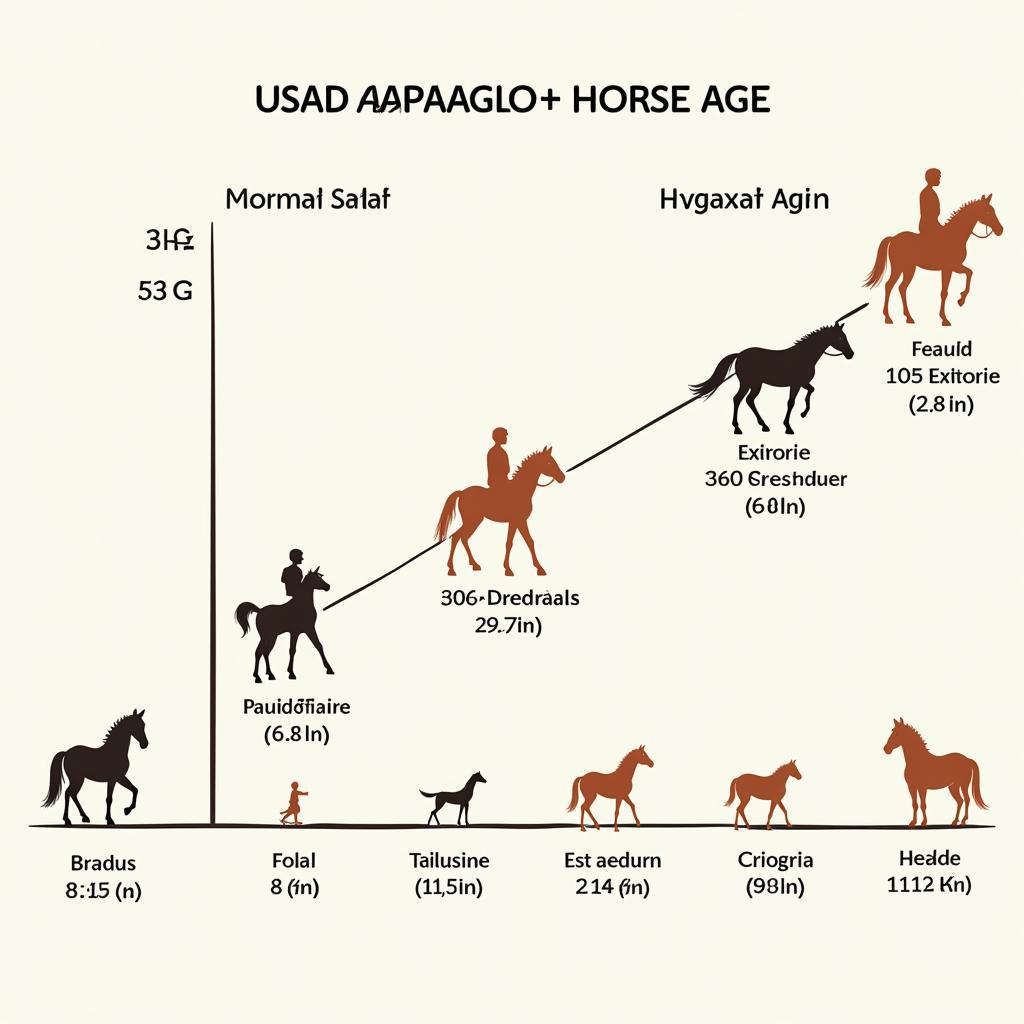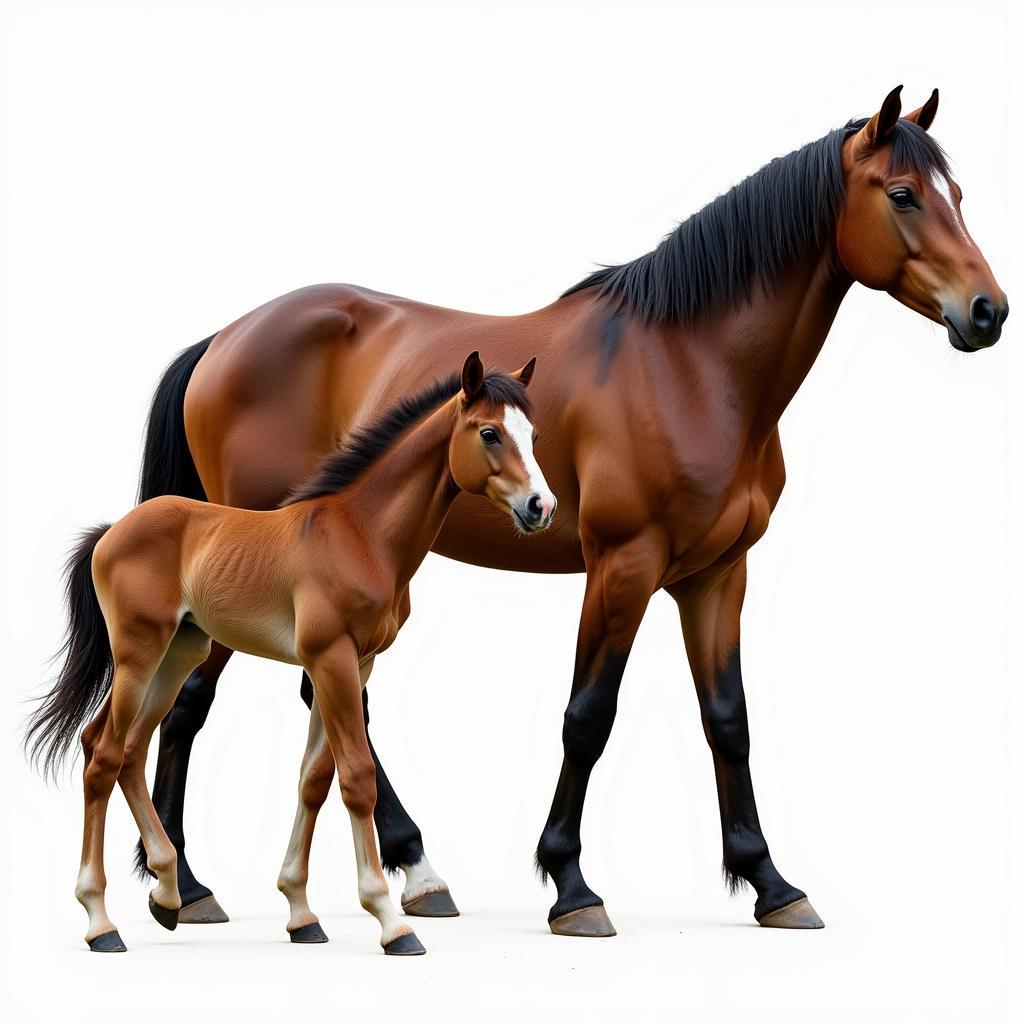Understanding the age of a horse in comparison to human years isn’t a simple one-to-one conversion. While we can’t perfectly equate a horse’s 5 years to a human’s 30, there are established charts and methods to help us grasp the different life stages of a horse and how they relate to our own. This article dives deep into the topic of equine aging, exploring the nuances and providing a comprehensive understanding of “How Old Are Horses In Human Years?”
 Horse Age Comparison Chart
Horse Age Comparison Chart
One common misconception is that one horse year equals seven human years. This simplification doesn’t accurately reflect the complexities of horse development. For instance, horses reach sexual maturity much earlier than humans. A horse can reproduce by the age of two, which wouldn’t be comparable to a 14-year-old human. Therefore, a more nuanced approach is needed. You can find a great collection of 14k gold horse necklace on our website.
Decoding the Horse Years: A Comprehensive Guide
To effectively compare horse age to human age, we need to consider the various stages of a horse’s life and the comparable developmental milestones in humans. Several factors influence a horse’s aging process, including breed, size, and overall health.
The First Year: A Time of Rapid Growth
The first year of a horse’s life is equivalent to roughly 6-8 human years. During this period, they experience rapid physical development, transitioning from foal to weanling.
- Birth to 6 months: Similar to a human infant, a foal is entirely dependent on its mother for nourishment and protection.
- 6 months to 1 year: This stage is akin to a human toddler learning to walk and explore the world. The foal becomes more independent and begins to graze.
 Horse Foal Growth and Development
Horse Foal Growth and Development
Adolescence and Beyond: A Shifting Pace
As horses mature, the rate of aging slows. The second year of a horse’s life is comparable to a human pre-teen or early teenage years (around 10-13). Between the ages of three and five, a horse reaches young adulthood, similar to a human in their late teens and early twenties. This is a period where they reach physical maturity and are ready to begin more intensive training. Looking for the right supplements for senior horses? Check out our selection.
Adulthood and Senior Years: A Gradual Decline
From six to twelve years old, a horse is in its prime, much like a human in their mid-twenties to mid-thirties. After twelve, the aging process begins to accelerate again, especially after twenty. Senior horses, like senior humans, can experience various age-related health issues. It’s crucial to adjust their care accordingly, focusing on nutrition, exercise, and overall well-being. Learn more about the majestic cold blood horse.
How Can You Estimate a Horse’s Age?
While aging charts are helpful, several physical factors can help you estimate a horse’s age. These include:
- Teeth: Examining a horse’s teeth is one of the most common methods for determining age, especially in younger horses. The shape, angle, and markings on the teeth change over time.
- Appearance: As horses age, their coats may become coarser, and they may develop gray hairs.
- Overall Condition: Senior horses may exhibit signs of age-related wear and tear, such as stiffness or decreased muscle mass. It is important to pay attention to the horses hocks as they can indicate potential issues.
“Regular dental checkups are essential for determining a horse’s age and maintaining their overall health,” says Dr. Emily Carter, DVM, an equine veterinarian with over 20 years of experience. “Dental wear and tear can significantly impact a horse’s ability to eat and thrive.”
Why Knowing Horse Age Matters
Understanding your horse’s age in human years allows you to better cater to their specific needs at each life stage. Just like humans, horses require different care and management as they grow and age. “Providing appropriate nutrition and exercise based on a horse’s age is crucial for their well-being,” adds Dr. Carter. “A young, growing horse needs different nutrients than a senior horse.” Find a stylish jacket with horses in our online store.
In conclusion, while a direct conversion from horse years to human years isn’t entirely accurate, using age charts and considering developmental milestones provides a helpful framework. By understanding the nuances of equine aging, we can provide the best possible care for our equine companions throughout their lives.
FAQ
- What is the average lifespan of a horse? The average lifespan of a horse is between 25 and 30 years.
- At what age is a horse considered a senior? Generally, horses are considered seniors around the age of 15-20.
- Can you ride a senior horse? Yes, many senior horses can still be ridden, but their workload should be adjusted based on their health and fitness level.
- What are some common health issues in senior horses? Arthritis, dental problems, and metabolic issues are common in older horses.
- How can I best care for a senior horse? Providing a comfortable environment, appropriate nutrition, and regular veterinary care is crucial for senior horse well-being.
Need assistance with your horse? Contact us at Phone Number: 0772127271, Email: [email protected] or visit our address: QGM2+WX2, Vị Trung, Vị Thuỷ, Hậu Giang, Việt Nam. We have a 24/7 customer service team.